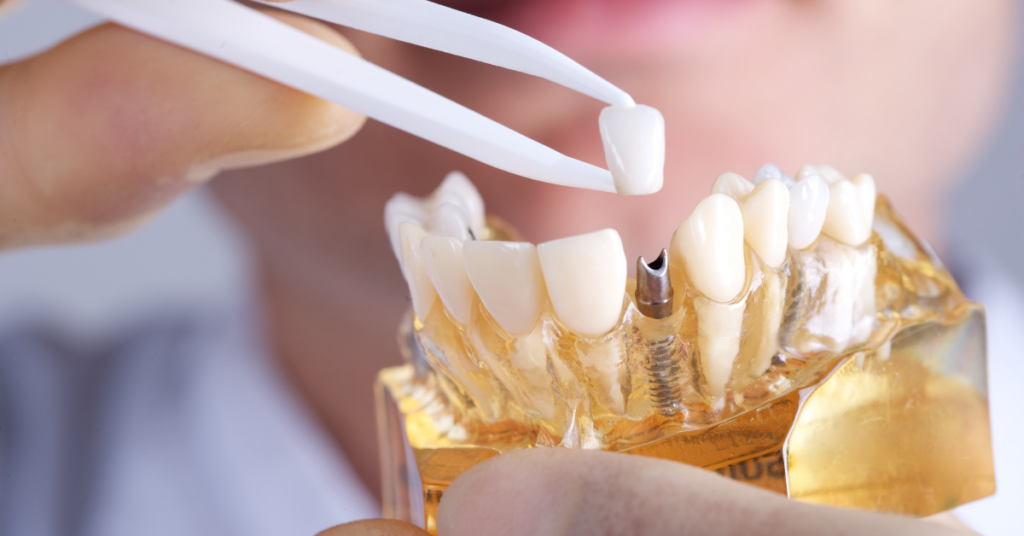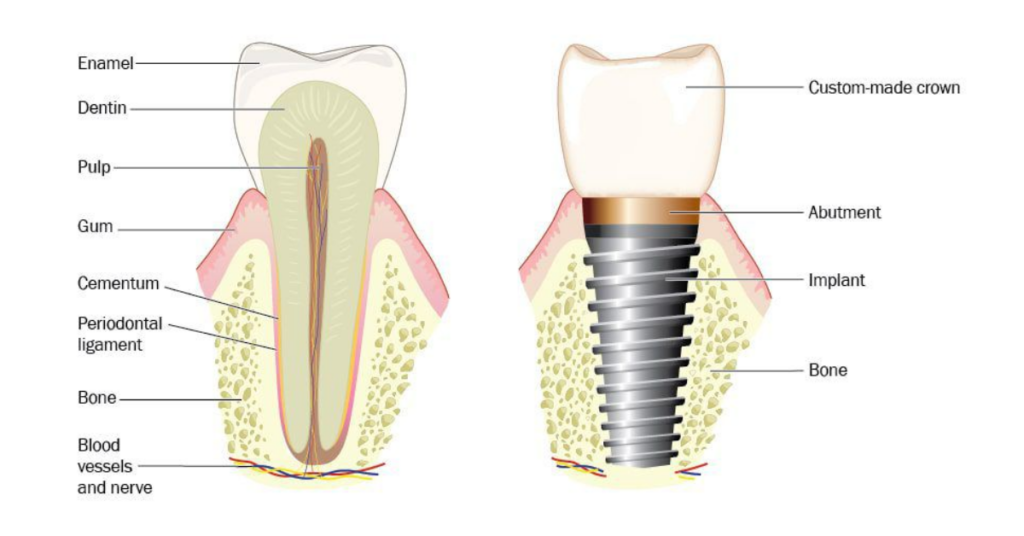Article reviewed by:
Dr Tan Kian Meng • Prosthodontist

Dental implants are an alternative option for replacing missing teeth, closely mimicking your original teethlook, function, and feel. They comprise three essential components:
- A titanium implant fixture that integrates with the bone.
- A connecting abutment.
- A custom-fabricated crown designed to blend with your original teeth.
While dental implants are designed for durability and longevity, implant failures can occur. This blog post addresses some common dental implant failure queries with insights and guidance from professionals.
- Are Dental Implant Failures Common?
- What Are Some Leading Causes of Dental Implant Failure?
- What Are the Signs of Dental Implant Failure?
- Can a Failed Dental Implant Be Replaced?
- What Are Some Tips to Prevent Dental Implant Failure?

Anatomy of a natural tooth vs a dental implant (Credit: newteethchicagodentalimplants.com)
Are Dental Implant Failures Common?
Although the prospect of dental implant failure might seem daunting, research suggests that dental implants have a success rate of around 95%. Implant surgeries typically result in successful outcomes thanks to surgical methods and pre-operative assessments.. However, like any medical procedure, some risks and complications may occur.
What Are Some Leading Causes of Dental Implant Failure?
While dental implant failures are uncommon, they can still happen for various reasons. Understanding these can help minimise risks and ensure your implants’ longevity. . Here are some of the leading causes:
Peri-implantitis
Peri-implantitis is an inflammatory condition affecting the tissues surrounding a dental implant. It is one of the leading causes of implant failure. This condition arises when bacteria accumulate around the dental implant, leading to infection and subsequent bone loss. Risk factors include poor oral hygiene, smoking, a history of gum disease, unfavourable implant placement, and poorly fitted restorations. Addressing these is recommended for the health of your implant.
Poor Post-surgery Care
As much as the surgery is a successf, the standard of post-surgery care is essential to help minimise the risk of complications.During the healing phase, you are advised to follow a soft food diet and practise good oral hygiene. Attending post-surgery check-ups as indicated by your dental specialist or dentist is essential to help ensure the implant site is recovering well.
Malpositioning of the Dental Implant
Potential misalignment may occur due to a non-ideal position in the bone for an implant. When this happens, the final outlook of your dental crown and implant may look unnatural. Removing misaligned implants poses another risk, which may cause damage to the bone and adjacent teeth.
Poor Impression-taking
The accuracy of impressions used to create the crown plays a significant role in the success of dental implants. Imprecise impressions can lead to poor fit, appearance, and function of the crown, potentially allowing bacteria to invade and cause infection.
Other Factors
Here are some other factors that may affect the bones’ healing ability, potentially resulting in a lower success rate:
1. Gum Diseases
Before dental implant surgery, your dental specialist or dentist will conduct a routine check to ensure your gums and jaw bones are healthy. The presence of gum disease could mean that your gums and jaw bones are more prone to infection if left untreated.
2. Bad Habits
Some bad habits, such as smoking, can also cause dental implants to fail. Smoking can cause blood vessels to narrow and reduce blood flow, potentially resulting in a slower healing process. Therefore, weaning from smoking would aid recovery and increase implant success.
Another bad habit includes poor oral hygiene. Poor oral hygiene enables bacteria to grow, potentially developing inflammation of the tissue surrounding the surgery site, resulting in infection. Negligence in oral hygiene may also contribute to gum disease and bone loss.
3. Other Medical Conditions
Cancer treatment and radiation may slow the healing process after surgery. It is advisable to discuss any medications or treatments that you are currently on with your dental specialist or dentist. Constantly update your dental specialist or dentist on any changes to your health or medical history. This will help your dental specialist better understand your conditions and suggest a suitable treatment method.
4. Allergy Reaction
Every human body is unique to the individual. You may be allergic to titanium alloy, a common material used for dental implants. Some symptoms may include swelling, tongue redness, and a tingling sensation. Your dental specialist may suggest using a different implant material or other treatment modalities if an allergy occurs.
5. Teeth Grinding
Bruxism is a condition where you grind or clench your teeth. With chronic bruxism, you may feel excessive pressure and persistent pain in your gum. As a result, the integration process between your implant and jaw bones may be challenging.
What Are the Signs of Dental Implant Failure?
After the dental implant surgery, you may experience some discomfort or sensitivity during healing. This is usually manageable with medications prescribed by your dentist. However, certain symptoms may indicate a more serious issue, potentially signalling dental implant failure. Here are some signs to watch for:
- Persistent severe pain and discomfort: While some discomfort is expected, ongoing severe pain may suggest an issue with the implant integration or an infection.
- Difficulty chewing or talking: If the implant feels uncomfortable or painful when chewing or speaking, it may not function optimally.
- Gum swelling and infection: Signs of infection, such as persistent swelling, redness, or pus around the implant area, require immediate attention.
- Gum recession around the implant: Receding gums around the implant can expose parts of the implant structure, which is not typical and may indicate problems.
- A wobbly or loose implant: Any movement in the implant suggests a sign of failure, as implants are designed to be firmly anchored to the bone.
Suppose you experience these symptoms or notice something unusual about your implant site. In that case, it is advisable to schedule a check-up with your dental specialist or dentist. Early detection and intervention can prevent further complications and help salvage the implant.
Can a Failed Dental Implant Be Replaced?
During your visit, your dental specialist or dentist will take an x-ray to examine the implant and its surrounding bones. Should the implant fail, your dentist can easily remove it under local anaesthesia. If bone loss is present, a bone graft may be required to improve the site before replacing the implant.
The replacement process may take a few months as the area has to heal before inserting a new implant. During this time, your dental specialist will discuss ways to reduce risks that may have caused the implant to fail. Following the recovery instructions and care for your implants is advisable to support the healing process and ensure the success of the new implant.
What Are Some Tips to Prevent Dental Implant Failure?
Ensuring the long-term success of your dental implants involves taking proactive steps towards maintaining oral health and adhering to certain practices for implant care. Here are some tips to help minimise the risk of dental implant failure:
- Maintain good oral hygiene: Brushing twice daily with a soft-bristled toothbrush and flossing at least once daily are critical. This helps prevent plaque buildup, which can lead to peri-implantitis.
- Follow a healthy diet: Eating a balanced diet rich in vitamins and minerals supports overall health, including the health of your gums and teeth.
- Regular dental check-ups: Visiting your dentist every six months for a routine check-up allows early detection of potential issues before they escalate.
- Quit smoking: Smoking can potentially impair healing and increase the risk of implant failure. Quitting smoking is recommended to enhance oral and overall health.
- Avoid damaging habits: Habits like teeth grinding or using your teeth as tools can exert excessive force on implants, leading to potential damage. Discuss with your dentist how to manage habits like bruxism effectively.
- Properly manage chronic conditions: Conditions like diabetes or osteoporosis can affect implant success. Managing these conditions with the help of your healthcare provider is essential for maintaining implant health.
By following these guidelines and working closely with your dental specialists, you can enhance the durability and functionality of your dental implants.
Ensuring the Success of Your Dental Implants
The journey to maintaining and ensuring the success of your dental implants is a collaborative effort between you and your dental care team. While dental implants have a high success rate, understanding the factors that can lead to implant failure and how to prevent them is key to achieving lasting results.
As a dental clinic in Singapore, our professionals are dedicated to providing dental care options and guidance to keep your implants in optimal condition. Your commitment to following the recommended care routines and attending regular check-ups plays a vital role in the long-term success of your dental implants.





